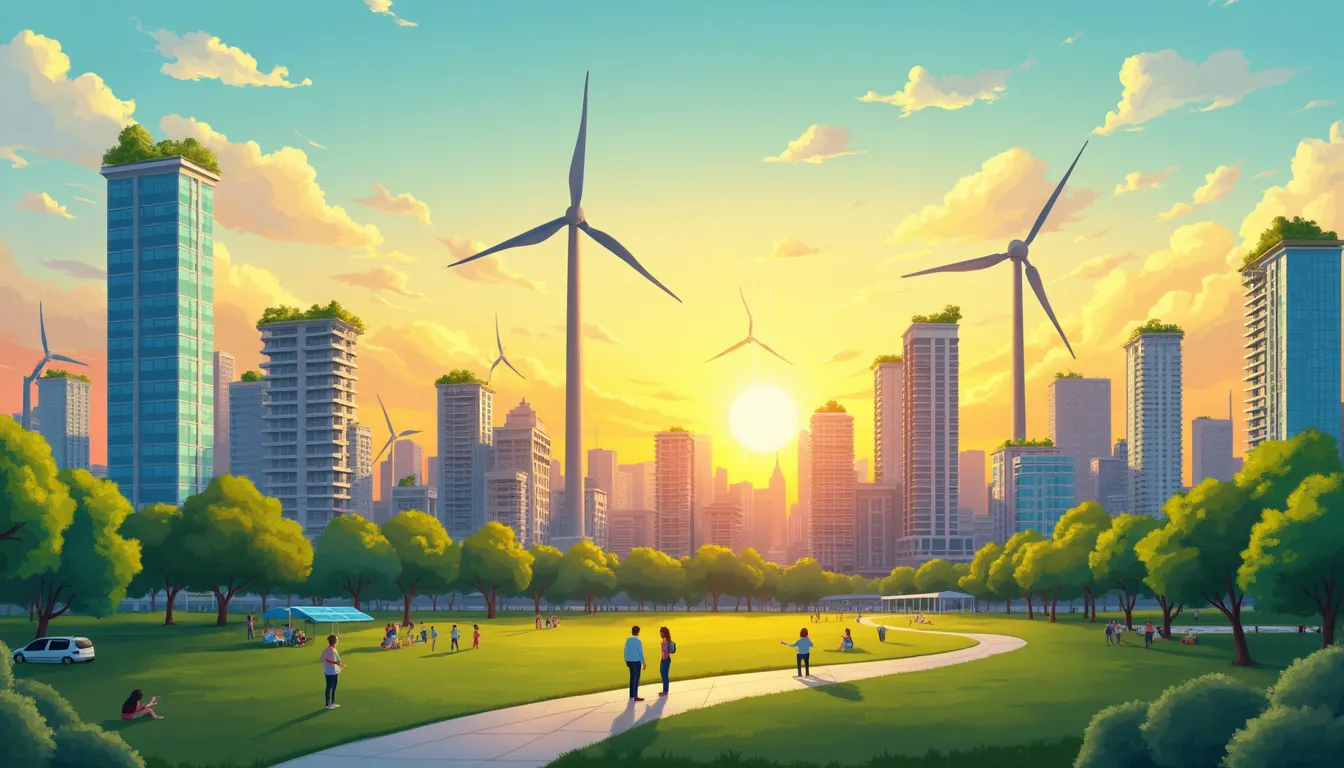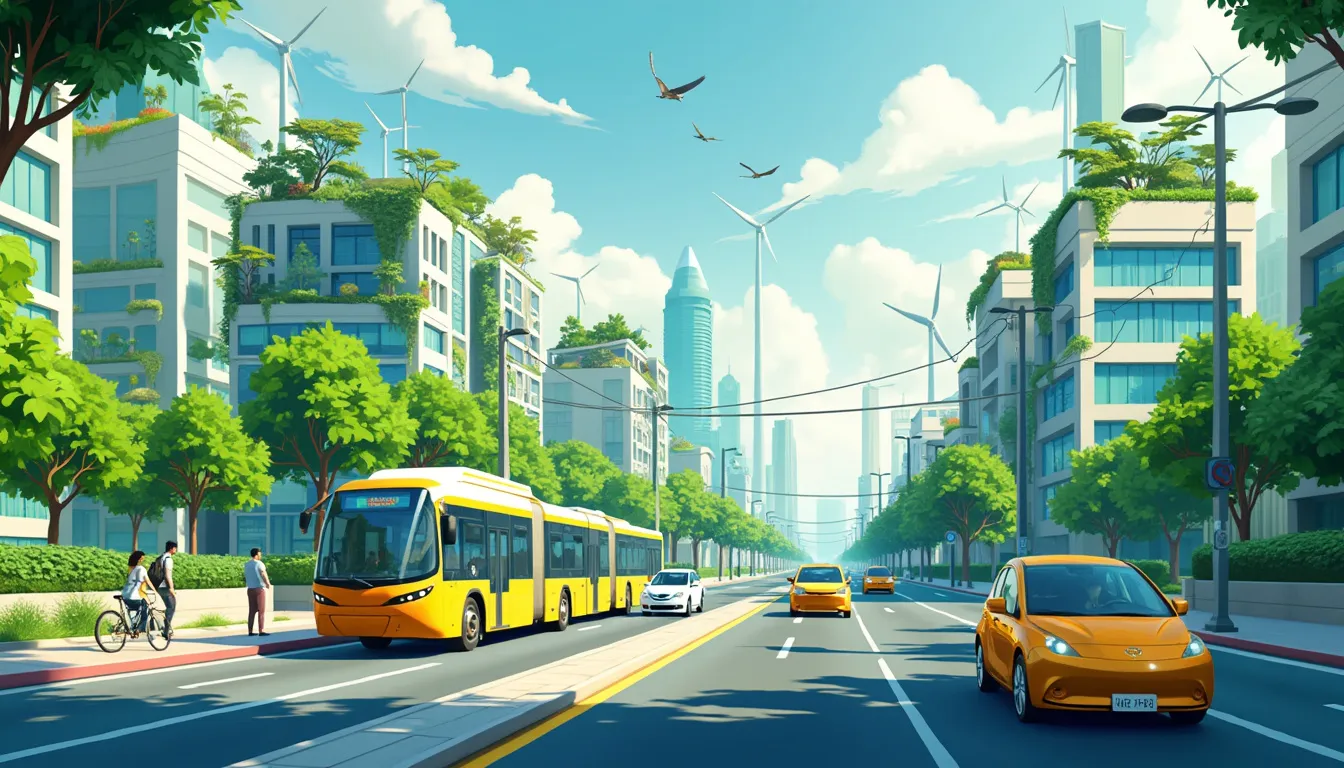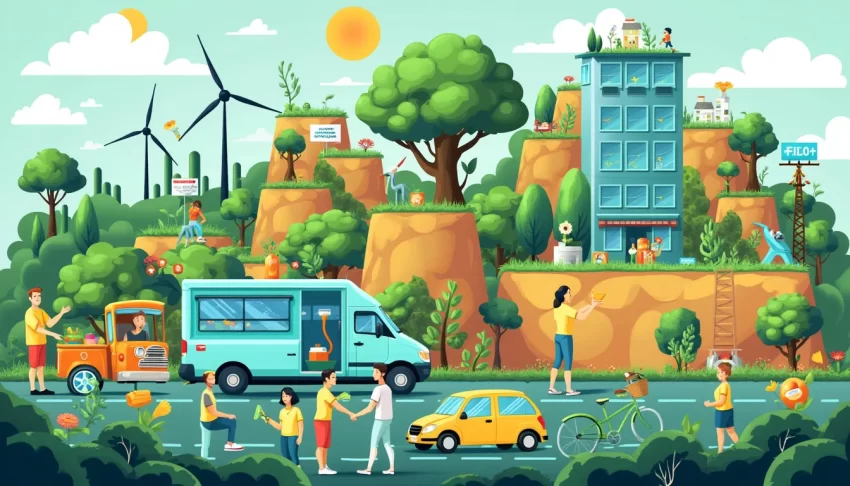As we move further into 2023, the landscape of business is evolving at a brisk pace, with sustainability taking center stage. Gone are the days when eco-friendly practices were merely optional or a secondary concern. Today, sustainability is a vital pillar of business strategy, influencing how companies operate, engage with their customers, and plan for the future. This shift is more than a trend; it’s a response to global challenges such as climate change, resource depletion, and increasing consumer demand for responsible corporate behavior.
Key industries, including technology, manufacturing, and retail, are embracing sustainable practices like never before. These sectors are not just adopting green initiatives to offset their environmental footprints; they are integrating sustainability into their core business models. This paradigm shift underscores the significance of 2023 as a pivotal year for sustainable development—a year where innovation and responsibility converge to redefine what it means to be a sustainable company.
In this article, we will delve into the top trends among sustainable companies in 2023, uncovering how they’re leading the charge towards a greener, more resilient future. From the widespread adoption of renewable energy sources to the implementation of advanced sustainable technologies, companies are driving impactful changes. We’ll also explore the rise of the circular economy, increased transparency, and rigorous sustainability reporting—all key elements shaping the future of sustainable business practices.
By examining real-world examples and drawing insights from industry leaders, we aim to inspire both individuals and businesses to embrace sustainability wholeheartedly. Whether you’re looking to make small, meaningful changes at home or spearhead sustainable initiatives within your organization, this article offers a comprehensive guide to the influential trends that are defining 2023. Join us as we explore how sustainable companies are not only making a difference today but are laying the groundwork for a healthier, more sustainable planet for generations to come.
Introduction to Sustainable Companies in 2023
The importance of sustainability in business has never been as pronounced as it is in 2023. Climate change, resource depletion, and growing consumer awareness are prompting companies across the globe to evaluate and revamp their operational models. Sustainable companies are not only gaining a competitive edge but also playing a crucial role in fostering a healthier planet.
Key industries, from technology to fashion and agriculture, are increasingly embracing sustainable practices, recognizing that their future success hinges on their environmental stewardship and resource efficiency. Notably, the energy sector has seen a remarkable shift, with companies investing heavily in renewable energy sources to reduce their carbon footprint. Likewise, the fashion industry is making strides towards adopting recyclable materials and ethical production practices to mitigate its massive environmental impact.
The year 2023 has emerged as a pivotal moment for sustainable development, marked by significant advancements and a palpable urgency. This urgency is driven by international agreements, evolving regulations, and a growing number of stakeholders demanding that businesses take responsibility for their environmental impact. As a result, sustainable companies are setting ambitious goals and exploring innovative solutions that go beyond compliance to create lasting and meaningful change.

Trend 1: Adoption of Renewable Energy Sources
One of the most remarkable trends among sustainable companies in 2023 is the widespread adoption of renewable energy sources. As the detrimental effects of climate change become more apparent, businesses across various sectors are stepping up their commitment to reduce their carbon footprints and switch to cleaner energy.
Increased Investment in Solar, Wind, and Other Renewable Energies
Sustainable companies are significantly ramping up their investments in renewable energy technologies, primarily solar and wind power. Solar energy, with its rapidly decreasing cost and increasing efficiency, has become a frontrunner in these efforts. The International Renewable Energy Agency (IRENA) reports that the cost of solar PV electricity has fallen by 82% since 2010, making it a viable option for companies looking to go green.
Wind power is another sector witnessing substantial investment, especially in countries with vast open spaces or extensive coastlines. According to the Global Wind Energy Council (GWEC), global wind power capacity is set to double over the next decade, driven by both onshore and offshore projects. By channeling resources into these renewable energy sources, companies are not only cutting down on their greenhouse gas emissions but also positioning themselves as leaders in sustainability.
Examples of Leading Companies and Their Renewable Energy Initiatives
Several companies have emerged as pioneers in the shift towards renewable energy. For example, Google has been carbon-neutral since 2007 and continues to be a leading advocate for renewable energy. The company has committed to running all of its data centers and offices entirely on renewable energy by 2030, leveraging its immense technological prowess to achieve these goals.
Another prominent example is IKEA, the multinational furniture retailer. IKEA has invested heavily in solar and wind energy, with the ambition to become climate positive by 2030. The company has installed more than 900,000 solar panels on its stores and warehouses worldwide, and it owns 547 offsite wind turbines.
Meanwhile, the automobile industry has seen key players like Tesla driving the change. Tesla’s Gigafactories, which produce electric vehicles and energy storage products, are powered by renewable energy sources, showcasing a commitment to sustainability that the company hopes others will follow.
Impact on Carbon Footprint and Long-Term Benefits
The shift to renewable energy is having a profound impact on reducing the carbon footprints of these forward-thinking companies. By replacing fossil fuels with renewable sources, companies contribute to a significant decline in CO2 emissions. The Renewable Energy Policy Network for the 21st Century (REN21) reports that the renewable energy sector accounted for nearly 70% of net additions to global power capacity in 2021, a trend continuing robustly into 2023.
Aside from the obvious environmental benefits, the adoption of renewable energy sources also offers long-term financial advantages. Companies can lock in lower energy prices through power purchase agreements (PPAs), reduce exposure to the volatility of fossil fuel markets, and benefit from government incentives and tax breaks designed to encourage the use of renewables.
Moreover, sustainable companies are likely to see an enhancement in their brand reputation. Consumers and investors are increasingly favoring companies with robust sustainability practices. By adopting renewable energy, businesses can attract eco-conscious customers and investors, giving them a competitive edge in the marketplace.
In summary, the growing trend of adopting renewable energy sources underscores a pivotal shift in how companies approach their operations and environmental responsibilities. With significant investments in solar and wind power, leading companies not only demonstrate their commitment to sustainability but also reap both ecological and economic benefits. As this trend continues to gain momentum, it’s clear that renewable energy will remain a cornerstone of sustainable business practices well into the future.

Trend 3: Advanced Sustainable Technologies and Innovations
As we journey through 2023, the landscape of sustainable business practices continues to evolve, driven significantly by advanced technologies and groundbreaking innovations. These advancements are not only reshaping how companies operate but also paving the way for a more sustainable future. Here, we explore some of the most exciting technological developments in sustainability and how leading companies are harnessing their potential.
Technological Advancements Transforming Sustainability
One of the most remarkable trends is the rise of technologies like Artificial Intelligence (AI) and the Internet of Things (IoT). These tools are proving to be game-changers in optimizing resource use, enhancing efficiency, and reducing environmental impacts. For instance, AI can analyze vast amounts of data to identify patterns and suggest more efficient operations, while IoT devices can provide real-time monitoring and automated adjustments to improve energy efficiency.
Case Studies: Companies at the Forefront
Patagonia’s Smart Resource Management: The outdoor clothing company Patagonia has been a pioneer in integrating AI and IoT to manage their resources more efficiently. By utilizing IoT sensors in their production lines, Patagonia can closely monitor energy use, water consumption, and waste production. The data collected is analyzed by AI to pinpoint inefficiencies and guide sustainable improvements. This has led to significant reductions in their overall environmental footprint, setting a high standard for the industry.
Unilever’s Sustainable Supply Chain: Unilever, a global giant in consumer goods, leverages blockchain technology to enhance the transparency and sustainability of its supply chain. By implementing blockchain, Unilever can ensure that all aspects of production, from sourcing raw materials to final shipping, adhere to sustainability standards. This not only builds trust with consumers but also promotes responsible practices across the industry.
Future Outlook for Technological Advancements
The future of sustainability in business looks promising with continuous advancements in technology. Innovations such as carbon capture and storage technologies, renewable energy storage solutions, and advanced recycling methods are gaining traction and showing great potential. As these technologies develop, they will provide companies with more tools to minimize their environmental impact and achieve sustainability goals.
Furthermore, increased collaboration between tech companies and sustainable businesses is likely to spur even more innovative solutions. For instance, partnerships like the one between Microsoft and the agricultural startup Agrimetrics use big data and AI to enhance sustainable farming practices, demonstrating that cross-industry alliances can drive significant environmental benefits.
The Role of Startups and Investors
Interestingly, startups and investors are playing a crucial role in the tech-driven sustainability movement. Startups are bringing fresh ideas and innovative solutions to the table, often pushing the boundaries of what’s possible. Investors, recognizing the growing importance of sustainability, are increasingly funneling resources into these ventures, accelerating the development and adoption of new technologies.
Take the example of Climeworks, a startup specializing in direct air capture technology to remove CO2 from the atmosphere. With significant investments and support from venture capitalists and larger corporations, Climeworks has made notable strides in scaling their technology, illustrating the power of investment in driving sustainable innovation.
Embracing Technology for a Sustainable Future
In summary, the adoption of advanced sustainable technologies and innovations is a powerful trend among sustainable companies in 2023. From AI and IoT to blockchain and carbon capture, these technologies offer exciting opportunities to enhance sustainability practices across various sectors. Companies that embrace these advancements not only stand to benefit environmentally but also economically, as they drive efficiency and foster consumer trust.
As these technologies continue to evolve, they promise to play an even more vital role in shaping sustainable business practices. The key for companies is to stay informed about these developments and be proactive in integrating them into their operations. By doing so, they can lead the way in creating a more sustainable future for all.

Trend 3: Advanced Sustainable Technologies and Innovations
In 2023, sustainable companies are not just passively following green protocols; they are actively leading with advanced sustainable technologies and groundbreaking innovations. These pioneering companies are leveraging cutting-edge solutions like Artificial Intelligence (AI), the Internet of Things (IoT), and blockchain to revolutionize their sustainability practices and reduce their environmental footprints. Here’s a closer look at how technology is shaping the future of sustainability for businesses.
AI-Powered Solutions
Artificial Intelligence is becoming a linchpin in sustainable business operations. Companies are harnessing AI for predictive analytics, energy management, and efficient resource allocation. By analyzing vast amounts of data, AI can help predict energy needs, optimize production processes, and reduce waste.
Take, for example, Google’s use of AI in their data centers. In 2016, Google started using DeepMind’s AI to manage its data center cooling systems. The result? A 40% reduction in energy used for cooling, which translates to a 15% improvement in overall energy efficiency. This not only reduced their carbon footprint but also led to significant cost savings.
Internet of Things (IoT)
The Internet of Things is another game-changer, enabling sustainable companies to gather real-time data from connected devices, which allows for smarter, data-driven decisions. IoT sensors can monitor a wide array of environmental indicators, such as air and water quality, energy consumption, and waste management.
For instance, IBM is using IoT to drive sustainability in agriculture through their Watson Decision Platform. Farmers can collect and analyze weather data, soil conditions, and crop health parameters in real-time, enabling precision farming practices that minimize water and fertilizer usage, thus promoting environmental sustainability.
Blockchain Technology
Blockchain technology offers transparency and efficiency in sustainability reporting and supply chain management. This technology is proving to be a powerful tool in ensuring that companies are accountable for their environmental impact.
Take Provenance, a blockchain-driven platform, which is helping companies like Unilever trace the origins of their raw materials to ensure they are sustainably sourced. This kind of traceability increases consumer trust and drives ethical sourcing practices across the industry.
Biotechnology and Sustainable Materials
Innovation isn’t just limited to digital technologies. Biotechnology and sustainable materials science are opening new avenues for eco-friendly alternatives to traditional products.
Consider MycoWorks, a company pioneering in the field of biotechnology by developing sustainable materials from mycelium, the root structure of mushrooms. Their product, Reishi, is a biodegradable alternative to leather, reducing the reliance on animal products and the pollution associated with traditional leather tanning processes.
The Role of Energy Storage and Smart Grids
Energy storage technologies and smart grids are driving the integration of renewable energy into mainstream energy supply systems. By smoothing out the supply-demand mismatches typical of renewable sources like solar and wind energy, these technologies make renewable energy options more reliable and practical for everyday use.
For example, Tesla’s Powerwall is a home battery that stores energy generated from solar panels, ensuring that excess energy can be used when the sun isn’t shining. On a larger scale, projects like the Hornsdale Power Reserve in South Australia, which uses Tesla’s battery technology, are stabilizing grids and reducing energy costs, while also decreasing reliance on fossil fuels.
Future Outlook: The Path Forward
As we move further into 2023 and beyond, the role of advanced sustainable technologies is set to grow even more significant. Innovations in AI, IoT, blockchain, biotechnology, and energy storage are not only making sustainable practices more plausible and efficient but also more cost-effective. The synergy between these technologies and sustainability promises a future where businesses can operate at peak efficiency without compromising the environment.
Moreover, investment in sustainable technologies is projected to rise. According to a report by the International Energy Agency (IEA), global investment in clean energy technologies surpassed $1 trillion in 2022 and is expected to expand at a rapid pace. For businesses, this means the availability of more advanced tools and technologies to support their sustainability goals.
The marriage of technology and sustainability is a hopeful sign that achieving significant environmental milestones is within reach. While challenges remain, the innovation seen among sustainable companies today serves as an inspiring roadmap for others to follow. Embracing these technologies is not only an ethical choice but also a smart business strategy that paves the way for a resilient and sustainable future.
As we wrap our exploration of the top trends among sustainable companies in 2023, it’s clear that we are standing at the cusp of significant and transformative changes. The accelerated adoption of renewable energy sources signifies a substantial stride towards reducing carbon footprints and fostering long-term environmental benefits. Companies leading the charge with solar, wind, and other renewable initiatives not only reduce their reliance on fossil fuels but also pave the way for a more resilient and sustainable future.
The shift towards circular economy practices underscores a profound rethinking of how we use and dispose of resources. By embracing models that prioritize waste reduction, resource efficiency, and economic savings, companies are not just contributing to environmental health but also discovering robust business advantages. The case studies we’ve looked at illustrate that the circular economy is not just a theoretical concept but a practical, profitable strategy for sustainable growth.
Technological advancements, from AI to the Internet of Things (IoT), are rapidly becoming the bedrock of sustainable innovation. Companies that harness these cutting-edge tools are setting new benchmarks for efficiency and sustainability, highlighting how technology can be a powerful ally in our quest to protect the planet. The future appears promising, with continuous innovations anticipated to further enhance our ability to manage and mitigate environmental impacts.
Lastly, the growing emphasis on transparency and reporting is fostering an environment of accountability and trust. Sustainability reports and third-party audits are not just bureaucratic exercises; they are crucial in validating a company’s commitment to its environmental goals. The organizations that prioritize transparency are setting a vital example, showing that honesty and accountability can drive genuine progress in corporate sustainability.
Reflecting on these trends, the potential long-term impact on the global market is profound. As more companies embrace these sustainable practices, we can expect to see a ripple effect that extends beyond individual businesses to broader industry standards and consumer expectations. The cumulative efforts of adopting renewable energies, circular economy practices, advanced technologies, and transparent reporting will undoubtedly lead us towards a more sustainable and equitable world.
It’s a pivotal moment for all of us, whether as individuals, consumers, or business leaders, to recognize our role in this movement. By embracing and advocating for these sustainable practices, we contribute not only to the health of our planet but also to the resilience and future-proofing of our businesses. So, let’s take action—big or small—to integrate sustainability into our daily lives and workplaces, ensuring that we leave a positive legacy for generations to come.
Support Us: Check out our recommended products on Amazon.

